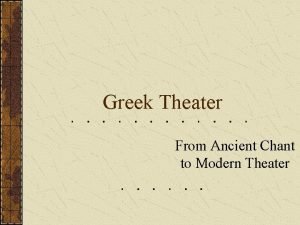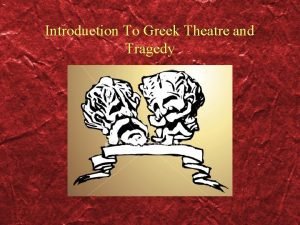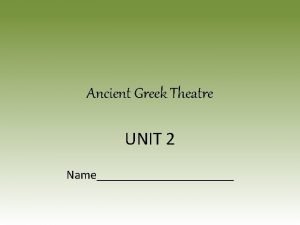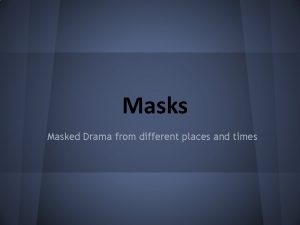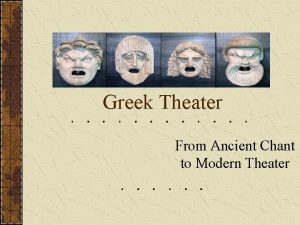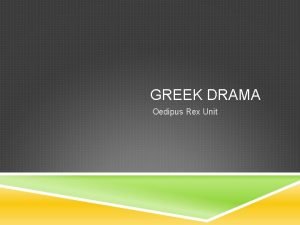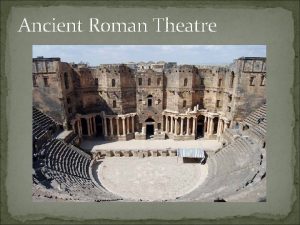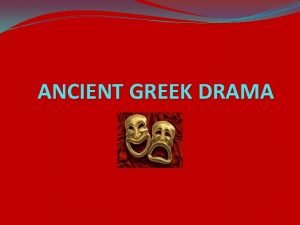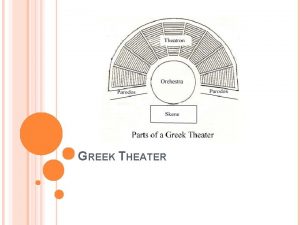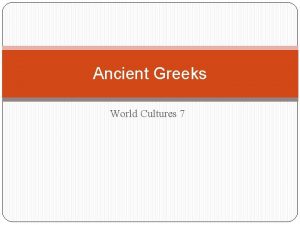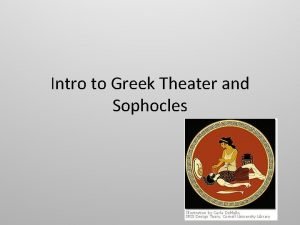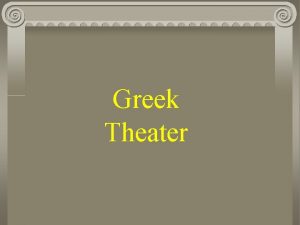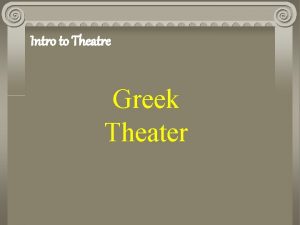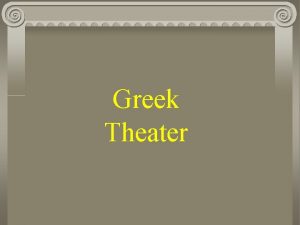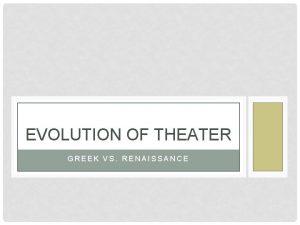Greek Theater Notes Ancient Greeks held ceremonies to














- Slides: 14

Greek Theater Notes



Ancient Greeks held ceremonies to honor the gods In one ceremony, to honor the god Dionysus, a group of chanters called a chorus danced around an altar upon which a goat was sacrificed. These ceremonies into dramatic contests with written plays. www. clevelandart. org/exhibcef/ mg/html/6269124. html The members of the chorus were called the “goat singers” and their ritualistic chant was called the tragos seido or “goat song. ” evolved

¨Who? Average citizens ¨What? Performances ¨When? c. 500 B. C. ¨Where? Greece

Why ? ? To worship the gods Greeks worshipped their gods by performing on religious holidays One of these celebrations paid tribute to Dionysus, God of Fertility, Wine and Rebirth homepage. mac. com/cparada/GML/

The Festival of Dionysus The Festival was held in Athens, Greece each Spring Each year three playwrights were chosen to present 3 tragedies and 1 satyr play (comedy) in the festival competition www. culture. fr/culture/arcnat/ vienne/en/theatre 3. htm

Three major Greek playwrights Euripedes ¨Medea Aeschylus ¨Prometheus Bound Sophocles ¨Oedipus Rex These three men were often the playwrights chosen to present their plays.

The Festival of Dionysus is considered the birthplace of true tragedy.

Common Themes of Greek Theatre Man’s Relationship to the Gods and the Universe Limits of knowledge Moral responsibility Human suffering

The Structure of Greek Tragedy Greek plays begin in medias res, in the middle of things, and build toward a climactic ending with alternating episodes and Episodes carry the plot forward. The action of the play occurs here. Odes feature the chorus explaining or reflecting on the action of the play. Prologos (1 st episode) Ode (strophe and 2 nd Episode 3 rd Episode antistrophe) Ode (strophe and 4 th Episode antistrophe) Ode (strophe and Exodos (5 th episode) odes. antistrophe)

Chorus The chorus traveled back and forth across the stage narrating the story in chants and dance. The leader of the chorus was called the choragos. Choruses originally contained 50 actors, but Aeschylus reduced the number to around 12. Strophe and Antistrophe Stanzas delivered as chorus moved first in one, then in the opposite direction.

Tragedy According to philosopher Aristotle, tragedy is… a dramatic representation of an action, severe, which evokes pity and fear and leads to a catharsis in the audience. In order for a play to be considered a tragedy, the audience must be led to feel a catharsis. A central figure in evoking this catharsis is the main character, or tragic hero.

The tragic hero… is Arête a man of noble stature, or high estate ¨who possesses Hamartia some error of judgment ¨which causes his The most common hamartia, or tragic flaw is hubris, excessive pride. Perepeteia reversal of fortune ¨but leads to his Anagnorisis. ultimate discovery or recognition
 Greek theater vs modern theater
Greek theater vs modern theater Ancient olympics opening ceremony
Ancient olympics opening ceremony Theatron greek theatre definition
Theatron greek theatre definition Greek drama masks
Greek drama masks Ancient greek theater
Ancient greek theater Ekkyklema greek theatre
Ekkyklema greek theatre Ancient greek theater masks
Ancient greek theater masks Ancient greek theater
Ancient greek theater Ancient greek masks
Ancient greek masks Ancient greek cultural values
Ancient greek cultural values What is the difference heliocentric and geocentric
What is the difference heliocentric and geocentric Ancient roman theatre history
Ancient roman theatre history Cult of dionysus
Cult of dionysus What are the national ffa colors and motto
What are the national ffa colors and motto Blue and gold ceremonies
Blue and gold ceremonies
